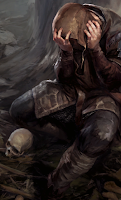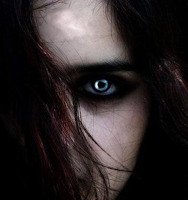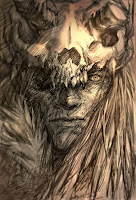By the gods, the warrior-shaman knows all.
The implications of that continue to occupy my thoughts, even as Aros and the others go about the business of breaking down camp in preparation for departure. Whatever Frode may know, he doesn’t press the matter, instead dragging Gola behind him to gather his own belongings.
I approach Aros to see if there is any way I can assist. There is tension in the air, a general sense of unease, and very little in the way of communication occurs. There is also an undertone of what might be distrust, though I’m unable to determine whether it’s directed at me or rather perhaps caused by my presence. Vargmenni has kept silent, careful not to share even a glance where Frode might witness it. My gaze lingers as she gathers her things, her darker skin a keen reminder that she also is not of this village; however she may have arrived here, it is obvious that she endured much with this tribe. She keeps to herself silently, and she is careful about her every action.
In a moment when Aros is close, I link together the few words of his language I know, pressing the silence. “Tovt, okt?” I ask, assuming I have pieced together enough words to ask if we return to his village. He nods but says nothing more as Frode commands the group to travel. There are alternating patches of snow-covered and bare ground where the wind has blown it into drifts, but otherwise travel through the valley is unimpeded, limited only somewhat by the speed of Gola as she is pulled behind Frode. I do my best to keep up, careful not to draw any more attention to myself than I already have.
The morning passes quickly, sun rising high into the sky. All is well until a noise pierces the serenity of the environment, a low groaning sound as of that in an animal in pain or distress. The group stops, all looking to Frode for direction. My memories are stirred by the sound, and though it’s not completely clear, it has all the hallmarks of coming from a large animal. Frode motions for the party to continue, heading towards the sound. I follow cautiously, keeping my thoughts to myself for now.The warriors don’t seem overly concerned, continuing for a few minutes until we ascend a small hill—below we can see a very large beast with long, shaggy hair and a pair of curled horns—a rothé. It is lying on its side, as if struggling or in pain. No blood is evident. I keep watch around us—there’s always a chance that it was the victim of some predator that still wishes to claim its prey.
“Rothé?” I ask, pointing to the creature. The warriors reply with a different word, clearly with the same meaning. I keep hoping for some commonality between our languages, but if it exists, I have not yet discovered it. The warriors take out their weapons and begin prodding at the creature, and it squeals in response. It seems more an act of discovery than cruelty, and for the first time since the previous night, Vargmenni approaches and stand at my side.“Sick,” she says.
“In their language, how do you say that? ‘Sick’?” She replies and I approach Frode and the warriors, watching their actions carefully.
Frode suddenly begins to speak, his tone escalating, nearly yelling, and he turns to Vargmenni who startles visibly. He shouts and points at her, waving his arms aggressively, and stomps towards her. There is a moment where I think he might intend violence, and I do not stir—this is not the time nor place to be a hero, so I watch silently as the situation plays out.
She regains her composure, quickly yelling back at Frode, and a clear argument ensues in their foreign tongue. “Vargmenni—fire hands!” she calls out in the common tongue, holding out her arms as she did the night before—though nothing happens. The tension grows, though I spare a moment to recognize the oddity of her using our shared language in her exchange with Frode.
Frode pushes his arms to his side and he begins to levitate, and he starts growling at her, towering above her. If violence is indeed Frode’s intent, it will commence imminently. With his attention focused on Vargmenni, desperate to end the infighting, I rush to the rothé’s side and plunge my knife into the flesh behind its ear where the skull is soft. Warm crimson floods over my hands as the beast lets out a death rattle before becoming still. Vargmenni turns to me instinctively, and this breaks whatever fury had overtaken Frode.
“Sick,” I reply in his language as Frode stares at me. Almost instantaneously, the situation seems defused. Frode walks to the side of the rothé and kicks it before turning to the other warriors and begins to issue more orders. They back away, seemingly content to leave the creature, and after a few moments of awkward silence the tension dissipates, and our party continues on its way. It seems odd, wasteful to leave such a resource as the rothé behind, but I don’t see a need to press the matter.
Not long after midday, we catch sight of a plume of smoke ahead to the northeast. The smoke is distant enough that there is no immediate concern, but the group stops briefly to motion towards it, accompanied by a brief discussion. Frode seems intent on heading in the direction of the plume.
Vargmenni keeps her distance as we walk, and despite my attempts to get close to him, a meaningful conversation about the smoke with Aros seems out of reach. The plume proves to be several miles away, our approach broken by the occasional copse of trees or jagged ground. None of the warriors displays much in the way of emotion, though there is a general sense of caution as we move.Finally, we descend into a low valley, the plume lying just ahead over a rise, its source not yet visible. There is still daylight though it is failing, and Frode begins issuing orders in a low voice, as if careful not to be heard. To my surprise, it seems as if order has been given to drop our gear, and the warriors begin arranging belongings on the ground. As the sun sets, dim light from a distant fire can be seen. I approach Frode, using gestures and crude language to ask about his intentions towards the fire.
When he replies, there is a hint of a sneer on his face, a look I have seen before. This man intends violence—that seems answer enough for now. There is nothing for me to do but wait with the others in silence as rations are passed around, mostly dried pieces of meat and tree bark that are chewed without providing much in the way of flavor or nourishment. Fortunately, I do not have an appetite.
The sun sets completely, and the sky grows black. The moon occasionally pierces the dense cloud cover, providing just enough in the way of light to be able to discern shadows. Another hour or two passes, and the temperature drops. We are all waiting for what’s coming, waiting on Frode and his erratic behavior.
The silence is broken by Frode, who stands and gathers the entire party. I am oddly pleased to be included, and he gives several instructions quietly. Though I do not understand his words, his intentions are clear. Warriors disperse to gather their weapons. Together, we begin to traverse the ground up the hill, climbing towards the source of the flame. We draw within perhaps a half mile—the scent of burning wood rides the shifting and swirling winds. We descend again into another valley, this one smaller, nestled between two hills. Ahead, a soft glow from a fire is visible. Frode whispers instructions to the three warriors, gesturing for them to accompany him up the hill, excluding me, Vargmenni and Gola. They begin a slow, quiet climb with their weapons.
I watch as they depart, and for the first time I am left alone with Vargmenni—and I try my best to efficiently ask her questions burning on my mind. I speak too quickly and she shakes her head, confused, so I distill my speech to the most basic words I can think of. “Friend? Enemy? Danger?”
She makes a motion to the top of my head, then lowers it to my shoulder, whispering a single word. “Miners”—a very surprising response. As Frode and the other warriors escape our vision, she withdraws something from within the folds of her tunic—a rolled sheet of vellum or bleached hide and sits on the ground, focusing on it intently. I have spent enough time in front of my own tomes to recognize this for what it is—arcane writing, a scroll or perhaps a spell formula.Meanwhile, Gola sits quietly—seemingly on edge, her face wrinkled in unrecognizable emotion. I am paralyzed with indecision, a feeling that has become all too familiar since my rebirth. Unwilling to interrupt Vargmenni in her frantic study, I stand awkwardly next to Gola, trying to read her emotions. The silence stretches, the woman staring blankly at me, never quite meeting my eyes. I am unsure how to even approach conversation with this woman.
Vargmenni continues to focus on the sheet of vellum, minutes passing quickly as my heart races, pounding loudly in my chest. Suddenly, a battle cry erupts from the hills, Vargmenni’s eyes lifting momentarily in distraction, though it’s clear she is intent on finishing whatever it is she is doing. “Focus,” is the only thing I say to her, using the same tone I had used with Selben countless times as my young apprentice wavered in his studies. Thoughts of Selben leave me unsettled—I cannot even remember my last conversation with him, it seems so long ago. Memories stir. Selben, Bonie…and at the very thought of her, my knees nearly collapse.
I catch myself and find Gola staring at me silently, and suddenly am reminded of my surroundings. Knowing that these few moments might be my only opportunity to learn more about Frode and this complicated situation, I use the only priestly power left at my disposal—originally intended for Frode, but one that would prove extremely dangerous given the circumstance—so I use it instead on Gola. Learning more about her might be key in understanding Frode.Appealing to Nobanion for guidance, I call upon his powers and focus on Gola, attempting to divine her nature. She either does not notice or does not care, instead she stands quietly, unflinching, staring at me silently. From her, I receive a sense of neutrality—if she is possessed of malevolence, it is hidden to me, and I am satisfied with that finding.
More shouts are heard in the night—not cries of pain or
sounds of battle, but shouting.
One of the voices is higher pitched than the others—perhaps
feminine—though it is obscured by the rest.
I spare another glance for Vargmenni, who continues to focus on her
study of the scroll. Unable to discern
the scroll’s meaning and unwilling to interrupt her, I make the decision to head towards the commotion.
I follow the path that seems the shortest to give me some vantage point,
following the footprints of one of the warriors as best I can in the dim
moonlight.
Frode and his warriors halt immediately as it issues a low roar, swiping great claws at the air in front of them. The warriors stop instantly, surprised by the creature’s appearance, and I pause to consider the encounter. The bear’s emanation did not suit the creature’s size, neither in intensity nor in volume. Its bellowing roar should echo throughout the valley, but instead it is muted, softer than it should be. I crouch quietly and watch as the situation unfolds, keeping my suspicions to myself and my presence unknown.
The great bear wastes no time, charging towards Frode and his party. The warriors raise their weapons in defense, seeking guidance—their leader belts out a war cry, and the warriors meet its charge. A huge ghostly claw swipes at Harka, spinning him around violently until he collapses in a heap nearby. It is difficult to tell if there is blood on the snow—a similar blow would eviscerate any lesser man.
Behind the spectral bear, I catch sight of a fleeting shape moving from into the cave—a smaller form, almost that of a child, wearing a dark cloak. I am quite certain that the other warriors have not seen this. I continue to crouch and watch—as much as I don’t want the same fate to befall Aros, this is not my fight. I do not understand the powers at play here.
Frode motions violently shouting instructions as Aros & Baln begin to back away. The bear makes a sweeping attack at Aros, but he manages to dodge, narrowly avoiding its reach. Frode rushes forward, sword raised high and strikes at the bear—suddenly, as quickly as it appeared, it vanishes. I grunt softly, my suspicions seemingly confirmed—for I believed this to be an illusion. Though illusion is a discipline of the arcane arts I cannot access, I am familiar with it in theory.There is a brief pause as the warriors scan their surroundings, looking for other threats. Harka remains motionless in the shadows, and in the confusion I slip away, heading back to Vargmenni and Gola lest my presence be noticed by Frode. Vargmenni seemed secretive about her study of the scroll, and I would not want Frode to return and catch her unawares. When I make it back, I find Vargmenni tucking away the vellum.
“Frode returns,” I utter breathlessly. “Harka was killed, I think.” I wait to see what reaction her reaction may be to those words. If Vargmenni is concerned, she does not show it.
Knowing that only a few moments remain, I draw my knife, showing it to Vargmenni. “Should I give this to Gola?” It is a question that had been on my mind, and I’m not sure of my own intent. She could do herself harm or attempt escape, and either way it could be dangerous for me if she were found with my blade. I do not hide my words from Gola, curious to gauge both of their reactions.
Gola stares silently, her face tight with restrained emotion. Vargmenni shakes her head no, and I sheathe the blade. “One last question,” I ask quickly. “Is she friend or enemy?”
Vargmenni eyes me intently before responding. “Neither.” There is no more time for discussion as Aros returns, alone, and begins issuing instructions that seem to indicate he wants the four of us to return to our camp.
“Where is Frode?” I ask Aros, assuming my meaning gets across.
“Harka” is his response.
I give him a questioning look before replying, again using one of the few words I know in their language. “Harka sick?” I’m curious to measure his response. He grunts, neither confirming nor denying the statement, almost as if it is inconsequential. Wordlessly, Aros pushes us along the path back towards camp.
When we arrive, the orders are clear that Aros wants the gear collected—I scoop up Harka’s pack while Aros, Vargmenni and Gola collect the rest of the packs. Once complete, we retrace our steps towards the hill and the mouth of the cave to find Frode and Baln sitting silently near the fire. Harka is on the ground nearby, breathing slowly though unconscious—there is no blood or visible wounds on the warrior. The cave opening is nearby, pitch black. No one seems inclined to pay it much attention, let alone enter the cave, at least for the moment.
I look at Harka, then to Frode and ask “What happened?” My meaning unclear, I gesture to Vargmenni to translate. She exchanges a few words quietly with Frode, and I am surprised by the cordial tone in her voice.
He mutters a few incomprehensible words and she replies. “False death.”
“Enemies?” I ask Frode using his language, pointing towards the cave mouth. Frode replies crudely, nodding. “Enemies.” With that he stands, commanding the group to claim the camp and fire and prepare to rest for the night. There are several packs that the other party left behind, and we begin to sort through them, cataloguing our findings.
I find a way to draw near Vargmenni, and gesture to her tunic where I know the roll of vellum to be hidden. Frode is distracted, stalking around the camp picking through gear so I risk a few quiet words. “Fire hands?” I ask her, and she gives a very quick, subtle nod before returning to her tasks.
I take a few steps away and stop to stare at the cave entrance, attempting to see if I notice any architecture, anything recognizable. Vargmenni appears silently at my side, making a careful gesture, raising her hand to my head and lowering it to her shoulder. In the trade tongue she utters a single word. “Dwarves.”




























